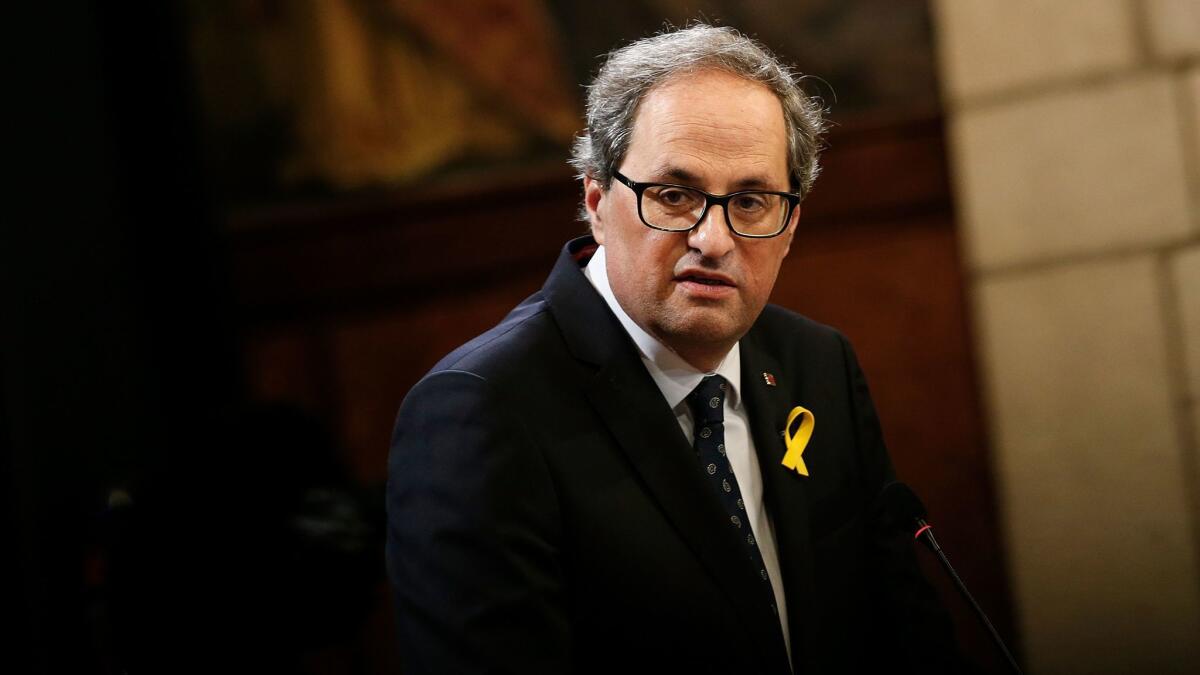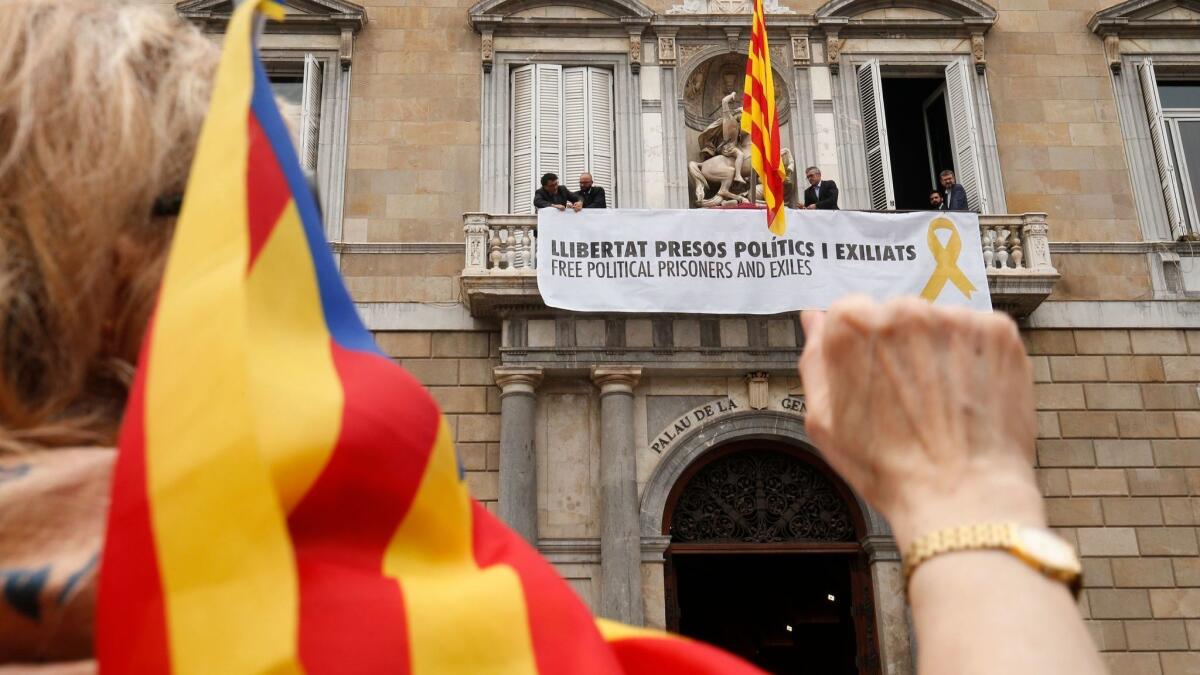New Catalan leader sworn in, vows to continue efforts to secede from Spain

- Share via
Reporting from BARCELONA — After eight months of political deadlock, Catalonia’s new regional government assumed power Saturday and promised to push for secession, prolonging the divisive independence conflict that led Spain’s prime minister to fire the Catalan parliament and assert control in October.
At a swearing-in ceremony in Barcelona — the seat of the regional government — Catalonia’s new president, Quim Torra, called an Oct. 1 secession referendum a “mandate” to push for independence for the prosperous northern region and continue the work of the previous Catalan government.
“We assume the promise of advancing the construction of an independent state,” Torra said at the ceremony, where his new Cabinet, relatives of imprisoned Catalan leaders and former Catalan politicians were gathered.
Torra called on Spain’s new central government — which earlier in the day also changed hands after the ouster of its previous prime minister — to negotiate with Catalonia “government to government.”
Saturday’s swearing-in ceremony marks the end to eight months of uncertainty over the governance of Catalonia. Spain’s central government had ruled Catalonia since Oct. 27, when then-Prime Minister Mariano Rajoy fired the regional parliament in response to its unilateral declaration of independence. The declaration came nearly a month after a low-turnout independence referendum organized by Catalonia’s government and deemed illegal by Spain showed a majority of voters wanted to secede.
Days after Rajoy dissolved the regional parliament, then-Catalan President Carles Puigdemont fled Barcelona for Brussels, fearing arrest. Several of his Cabinet members, including his vice president, were jailed on charges of sedition, rebellion and misuse of public funds, while others followed Puigdemont’s lead and also fled the country.
To replace the Catalan government, Rajoy called for snap elections on Dec. 21 with the hope that parties opposing independence would win.
The prime minister, however, lost his bet. Pro-independence parties earned a combined majority of seats in the Catalan parliament but spent months debating who should be the next president. Members of Puigdemont’s party, Together for Catalonia, argued the former president was the region’s rightful leader and sought to find a way for him to rule in absentia.
That hope was short-lived. Last month, Spain’s Constitutional Court suspended a law separatist politicians had enacted that could have enabled Puigdemont to lead from Germany, where he was free on bond.
The region had a May 22 deadline to select a new leader before being forced to call new elections.
Torra, a lawyer and book publisher from Puigdemont’s party, was narrowly elected May 14 after days of debate in parliament. Separatist parties selected the low-profile independentista as president for a simple reason: Torra was neither in jail nor in self-imposed exile.
The same morning that Catalonia’s government convened, a new prime minister assumed control in Madrid. Socialist Pedro Sanchez became Spain’s prime minister Saturday after Rajoy’s ouster in a no-confidence vote regarding corruption in his Popular Party.

Sanchez has voiced a willingness to start a dialogue with Catalonia’s separatist government in what experts call a divergence from the confrontational approach of his predecessor.
“The independentistas are going to have an interlocutor,” said Gabriel Colome, a political science professor at the Autonomous University of Barcelona. “This is a big change.”
Still, Marc Sanjaume, a researcher at Pompeu Fabra University in Barcelona, said while a new prime minister “is good news for independentistas,” changing the central government’s attitude toward secession will be “very complicated.” The most feasible gain for separatists, he said, would be transferring imprisoned politicians from jails in Madrid to jails in Barcelona.
Saturday’s swearing-in was at times emotional, with the spouses and siblings of jailed or self-exiled politicians reading letters their relatives had written to the new Cabinet, urging them to fight for independence.
Indeed, the former Cabinet was a specter in the room. Torra promised to remain faithful to the referendum results and the former government’s independence declaration. He ended his speech thanking each member of the former Cabinet.
“An immense hug to all of you,” he said.
Several dozen supporters donning separatist flags gathered outside the government building Saturday morning.
Standing with her husband in the plaza before the ceremony, Conxi Sanchez said it was a relief to have a Catalan government after more than half a year of direct Spanish rule.
“For now, at least we can govern,” she said. “We can fight so that the political prisoners are released from jail and the political exiles can return.”
Mercedes Moya, 80, mother of Miquel Buch, the new secretary of the interior, drank coffee with her husband and cousins at a cafe next to the Generalitat as they waited to attend her son’s swearing-in ceremony. The group was pleased, but not surprised, that the new government would continue pushing for independence.
“It’s the same as before,” said Jaime Moya, a cousin, smiling. “They are all friends of the other government.”
When asked whether she was nervous about her son’s new role, given that most members of Puigdemont’s Cabinet are either in jail or have fled the country, Moya tensed.
“Hombre,” she said, using a Spanish expression meaning she was stating the obvious. “I am a little bit.”
Not all Catalans are satisfied with the new government. Torra’s main opposition in parliament is the anti-independence Citizens party, which argues Torra’s continuity with Puigdemont’s approaches will make negotiation with the Spanish government impossible.
Despite opposition, the mood Saturday was triumphant.
As a growing crowd outside cheered lawmakers and government bigwigs such as former regional President Artur Mas and Barcelona Mayor Ada Colau as they exited the building after the ceremony, Torra appeared on a balcony overlooking the plaza. There, he pinned a banner with the Catalan and English phrases “Llibertat presos politics i exiliats” : “Free political prisoners and exiles.”
The crowd erupted with applause.
Bernhard is a special correspondent.
More to Read
Sign up for Essential California
The most important California stories and recommendations in your inbox every morning.
You may occasionally receive promotional content from the Los Angeles Times.









